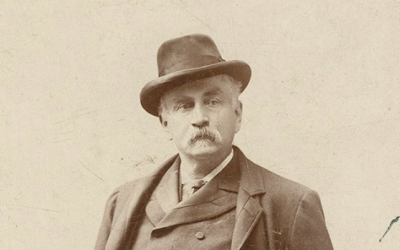Diaries & Journals
The word diary is from the Latin diarium or “daily allowance.” In Europe during the Renaissance, well-to-do young men kept travel journals. Soldiers recorded their experiences during the French and Indian Wars and the American Revolution. In America, explorers and settlers documented their travel westward, in part to aid those who followed them.
By the mid-seventeenth century, the personal journal or diary emerged as a tool with which their authors tried to make sense of their world. Those of a religious mind could record their personal failings and give thanks for blessings received. In secular matters, diaries recorded some of the most important events of the day, often from the point of view of those directly involved.
As education became common and writing materials became affordable, diaries became more popular. By the late nineteenth and early twentieth centuries, men and women of almost all economic and social classes were recording their activities, thoughts, and aspirations. In the twenty-first century, diaries continue to be kept in traditional volumes, and ever-changing digital formats offer new ways for people to record their lives.
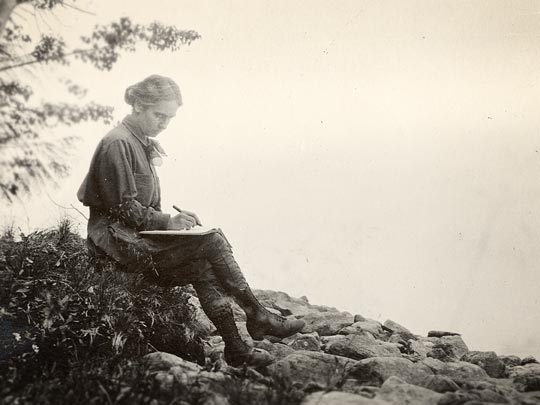
Diary of J.A. Hill, Civil War Soldier
Hundreds of Civil War diaries help expand our understanding of the war from the soldiers’ point of view. These diaries are revealing, not just for their accounts of battles and hardships, but for what they tell us about the tedium of life in camp and on the march, frustration at delays in getting accurate news on the progress of the war, and the relief of discharge, realizing that you had survived to return to family and friends.
Born in 1845 in Illinois, James Hill came west to Nebraska in 1867 after serving for three years in the 102nd Illinois Volunteers. Hill purchased a small tract of land northwest of Falls City, ultimately increasing his holdings to 640 acres. He married twice, and in 1905 retired to Falls City, where he died in 1925.
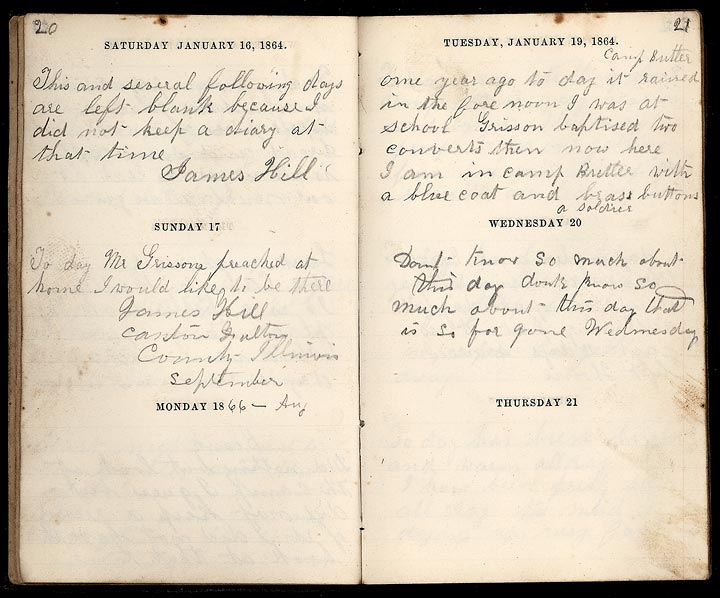
Hill noted on the front cover that he purchased his first diary for 60 cents on February 24, 1864, at Camp Butler in Springfield, Illinois. Although he did not have the book in his possession until late February, he felt compelled to add entries for January and most of February from memory, and for some dates he notes:
This and several following days are left blank because I did not keep a diary at that time. — James Hill
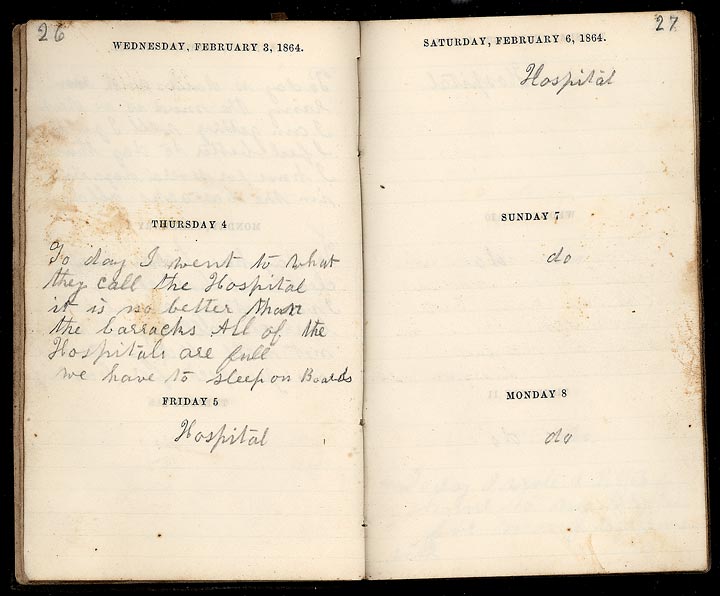
Hill delayed enlistment because of an unspecified illness. When he did join his unit, he quickly found himself in the hospital.
Feb. 4, 1864
To day I went to what they call the Hospital it is no better than the barracks all of the Hospitals are full we have to sleep on boards.
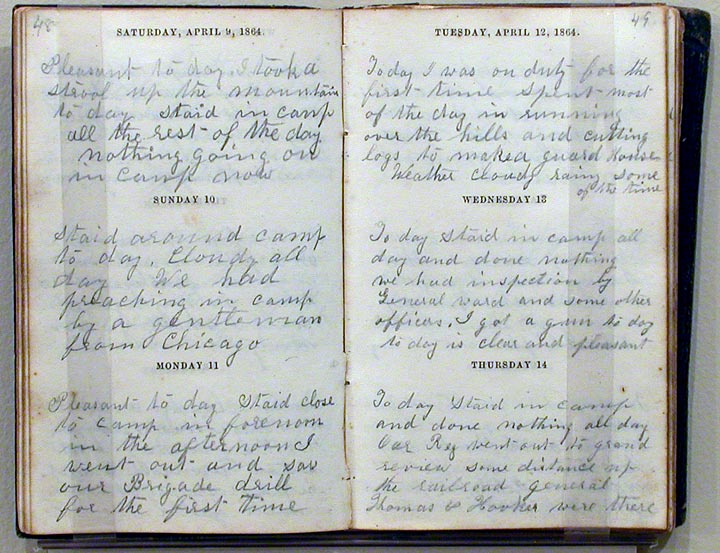
In addition to his health woes, which continued through the entire time of his service, Hill’s diaries include information on camp life, occasional skirmishes, lists of his expenses, and finally his discharge from the army. His entries are notable, not for their dramatic accounts of battle, but rather for his description of the tedium that was daily life in camp.
Wednesday 13
To day staid in camp all day and done nothing. We had inspection by General Ward and some other officers. I got a gun to day to day is clear and pleasant.
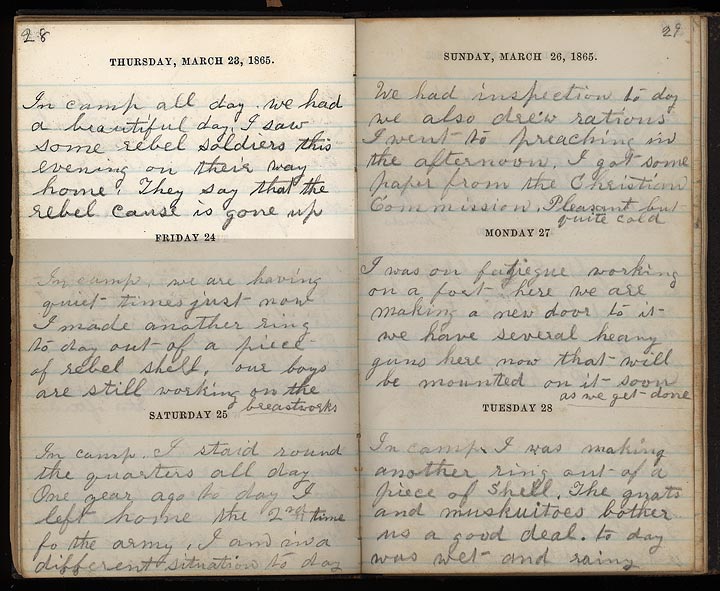
Thursday, March 23, 1865
In camp all day. we had a beautiful day. I saw some rebel soldiers this evening on their way home. They say that the rebel cause is gone up.
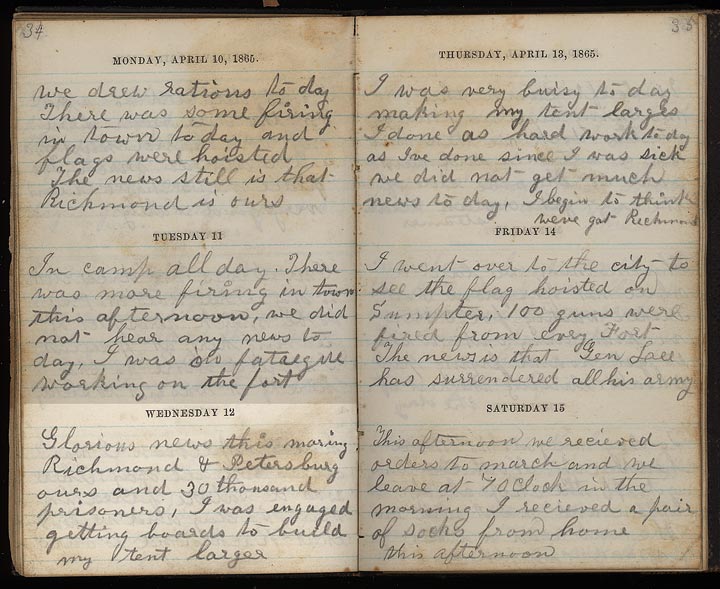
Wednesday 12, 1865
Glorious news this morning Richmond & Petersburg ours and 30 thousand prisoners. I was engaged getting boards to build my tent larger
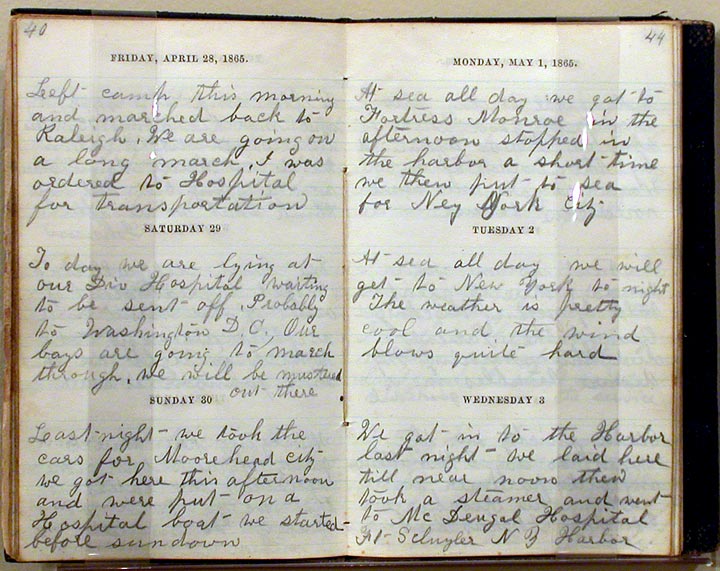
Raleigh N.C. Apr 29th (1865)
To day I am staying at our Div Hospital waiting for transportation to Washington. The war is over and we are all going Home. The Div is going to march through. We will most probably leave here to night and then good bye to Dixies Land I will go home and be a citizen once more The city of Raleigh is in mourning to day for the death of President Lincoln they are firing a gun every half hour all day
Hospital Boat H.S. Spaulding May 1st 1865
I am on my journey Home to day We are pursueing our way at sea off the coast of Virginia I begin to think that I will see my home once more. I am troubled with Dropsy in my abdomen One year ago to day our Colonel came to us at Wauhatchie Station Tenn and gave us marching orders for that great campaign against Atlanta since that time I have passed through some rough times but I expect to go home now to stay there.
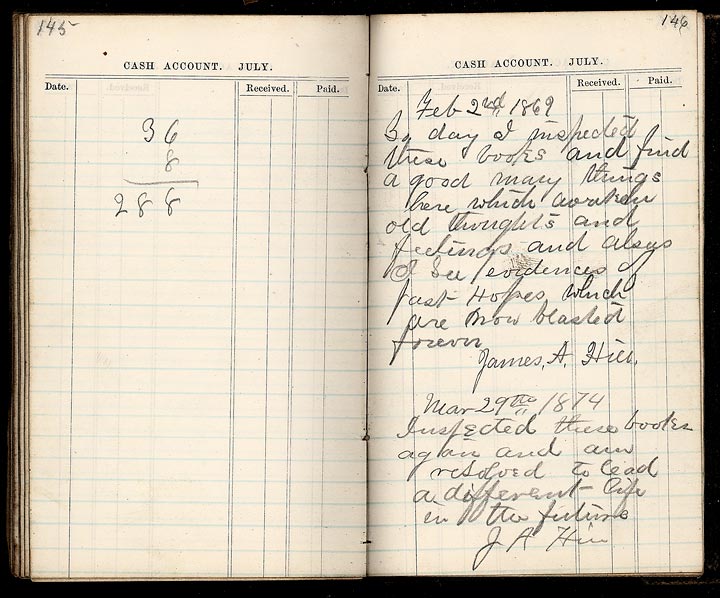
Long after the war had ended and James Hill had moved on to a new life in Nebraska, he reread his diaries and recalled his life as a soldier. Tucked away in the back of his 1865 diary are two entries from 1869 and 1871, in which he reflects on his life as recorded in these volumes:
Feb 2nd 1869
To day I inspected these books and find a good many things here which awaken old thoughts and feelings and also I see evidences of past Hopes which are now blasted forever James A. Hill
March 29th 1874
Inspected these books again and am resolved to lead a different life in the future. J.A. Hill
Diary of William Alford Richards, Surveyor
William Alford Richards was born in Grant County, Wisconsin, in 1849. Although he was denied enlistment in the Union Army due to his youth, he managed to find employment as an ambulance driver from 1863 to 1864.
At the end of the war, he returned to Wisconsin and taught in rural schools, attended high school in Galena, Illinois, and in 1869 moved to Omaha. There, a government survey party hired him to help survey Lincoln, Franklin, Buffalo, and Hayes counties in Nebraska and the boundary with the state of Wyoming. He also studied law in Omaha and became a civil engineer. In 1875 Richards left Nebraska for California, and then moved to Colorado and subsequently Wyoming, where he was elected governor in 1894. He was appointed Commissioner of the General Land Office in Washington, D.C., in 1903. William Richards died in Wyoming in 1912.
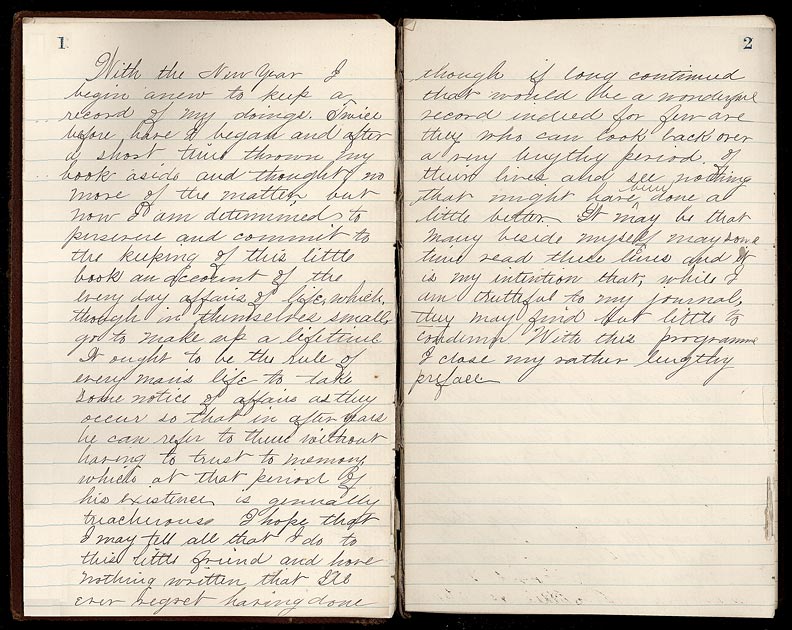
William Richards kept a detailed diary for the years 1869 to 1871, describing his move to Nebraska, his brief stay in Omaha, and his work on survey crews with all the difficulties, dangers, and excitement that life entailed. He began his journal with an explanation of why he proposed to keep such a record, something many diarists did at the time.
(probably January 1, 1869, Galena, Illinois)
With the New Year I begin anew to keep a record of my doings. Twice before have I began and after a short time thrown my book aside and thought no more of the matter, but now I am determined to persevere and commit to the keeping of this little book an account of the every day affairs of life, which though in themselves small, go to make up a lifetime. It ought to be the rule of every man’s life to take some notice of affairs as they occur so that in after years he can refer to them without having to trust to memory, which at that period of his existence is generally treacherous. I hope that I may tell all that I do to this little friend and have nothing written that I’ll ever regret having done, thought if long continued that would be a wonderful record indeed for few are they who can look back over a very lengthy period of their lives and see nothing that might have been done a little better. It may be that many beside myself may some time read these lines and it is my intention that, while I am truthful to my journal, they may find but little to condemn. With this programme I close my rather lengthy preface.
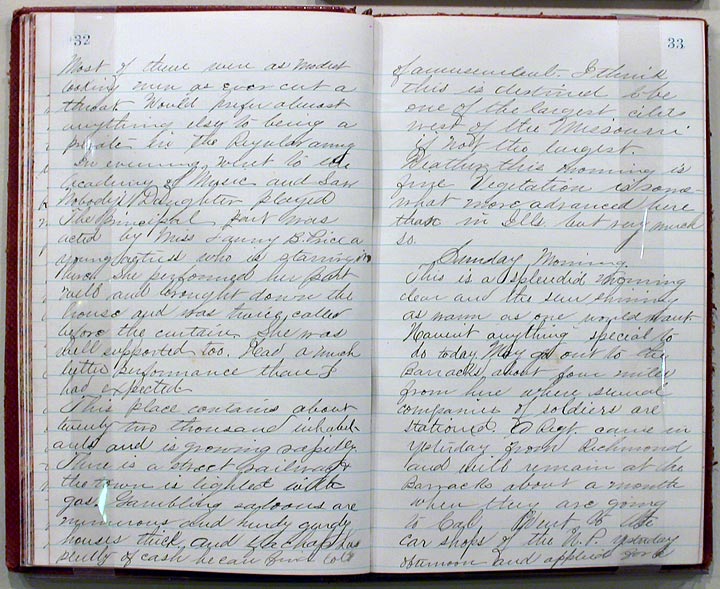
Early Nebraska towns were bustling places, and diary accounts of life in cities like Omaha can reveal aspects of the community that were not what town boosters included in their promotional material.
Sunday, Morning (April 18, 1869 Omaha, Nebraska)
This is a splendid morning clear and the sun shining as warm as one would want. Haven’t anything special to do today. May go out to the Barracks about four miles from here where several companies of soldiers are stationed. A Regt. came in yesterday from Richmond and will remain at the Barracks about a month when they are going to Cal. Went to the car shops of the U.P. yesterday afternoon and applied for a job. If I were a mechanic of any kind could get work in an hour. As it is I may not get anything to do. Several of their men quit last night as they have not been paid off for more than two months & the Co. is owing more than two million dollars in this city. In the evening went around to see the town after dark. Visited the Academy of Fun which is a low theater & beer hall. Their performances were not very chaste surely. On our way home stopped at a keno bank to see how the thing was done. Found the house crowded and all playing. Don’t think I’ll ever invest anything in the business as a fellow is bound to lose by it if he continues any time at all.
Wrote a letter to Auttie.
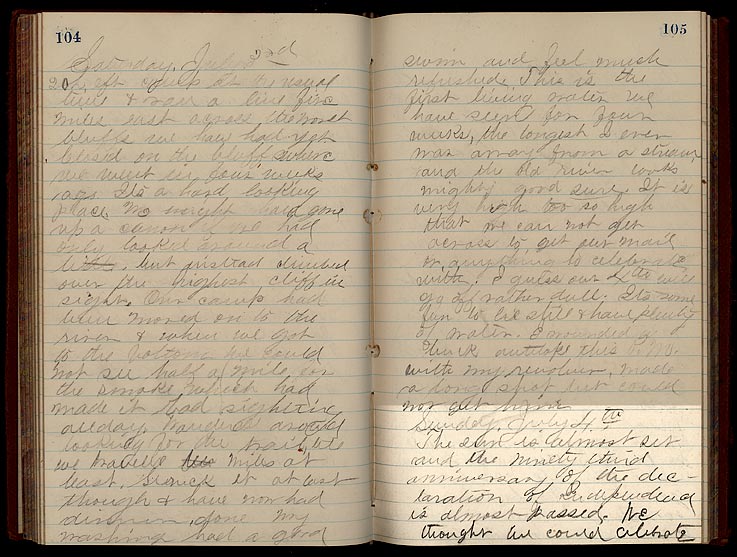
William’s diary entries while out in the wilds surveying the land were filled with accounts of hunting for food, struggling with the heat and storms of a Nebraska summer, and constant worries about Indian attacks that never occurred.
Friday, 18th
25 Went south from camp this morning three miles & west two miles and started from the township corner & ran north six miles over a very rough country. Came back three miles and got into camp at three o’clock. Walked nineteen miles before dinner. After walked about six miles more after an elk but could not get him though we got close to him. Ran our line through a village of prairie dogs who seemed very much surprised to see their village surveyed. Came across an elk horn five feet long with seven prongs from twelve to fifteen inches in length. It must have been an enormous animal to carry such horns.
Carried my carbine today which I have not done for several days but the indians are getting so near that we think it best to be very careful.
Diary of J. Sterling Morton, Statesman
J. Sterling Morton was born in Jefferson County, New York, in 1832. In 1850 he entered the University of Michigan and subsequently received degrees from both that institution and from Union College in Schenectady, New York. In 1854 he married Caroline Joy French of Detroit and that same year they moved to the Nebraska Territory. There he became editor of the Nebraska City News. He had an active political career as a member of the territorial legislature, secretary of the territory, acting governor, and finally, in 1893, United States Secretary of Agriculture. In 1897 he returned to Arbor Lodge, his home in Nebraska City, where he spent his remaining days editing his newspaper, The Conservative, and compiling a history of Nebraska.
Morton is best known as the father of Arbor Day. In 1872 the State Board of Agriculture adopted Morton’s resolution that April 10th of that year be set aside for tree planting. In 1874, Governor Robert W. Furnas issued the first proclamation designating Arbor Day, although it would not become a legal holiday until 1885, when the legislature set aside Morton’s birthday, April 22, as the holiday.
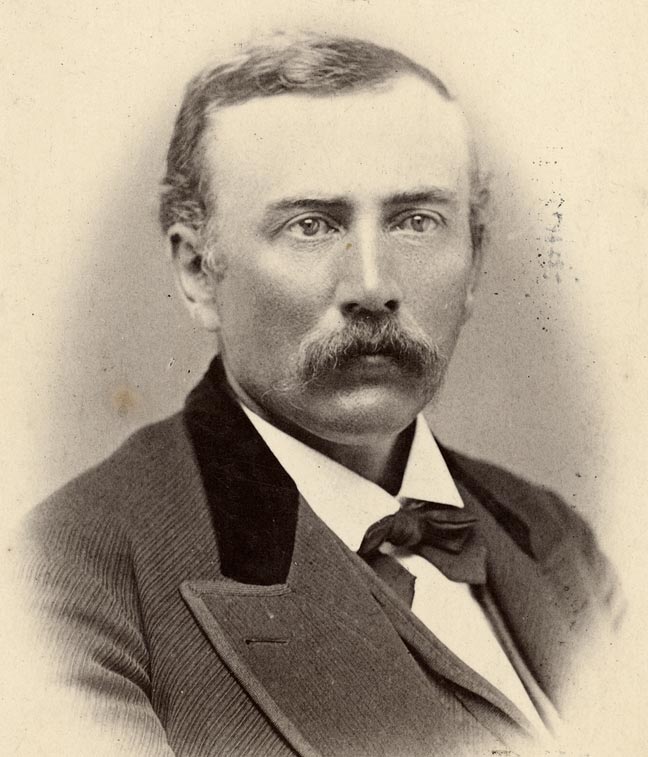
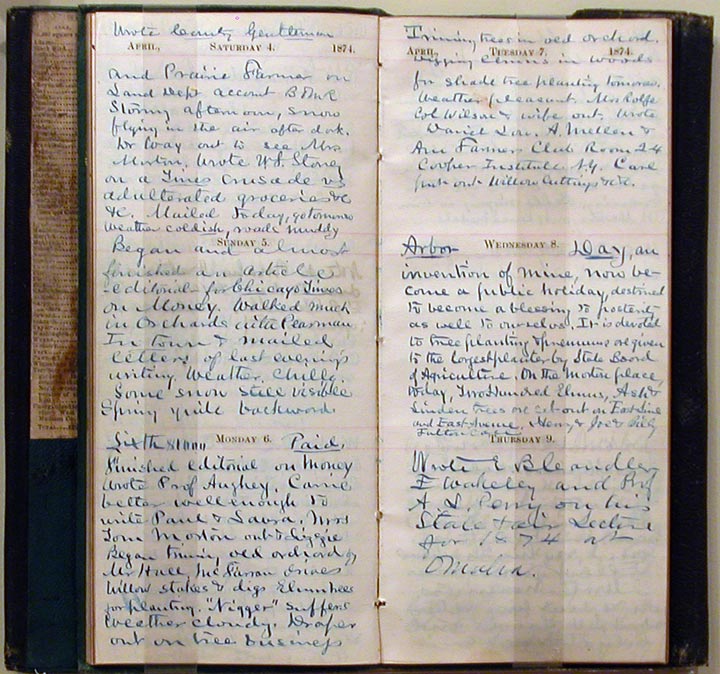
Diaries offer insight into what their creator believes to be their most important achievements in life. J. Sterling Morton’s 1874 entry celebrating the establishment of Arbor Day shows a reserved pride in his role in the creation of the holiday
April 8, 1874
Arbor Day, an invention of mine, now become a public holiday, destined to become a blessing to posterity as well as to ourselves. It is devoted to tree planting & premiums are given to the largest planter by State Board of Agriculture. On the Morton place, today, Two Hundred Elms, Ash & Linden trees are set out on East Line and East Avenue.
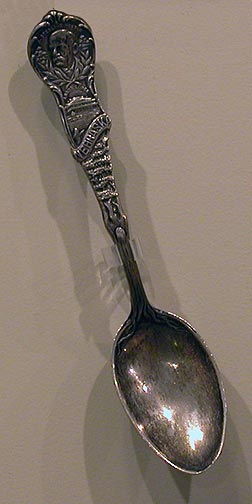
Arbor Day spoon given to Dawson Collins by his great nephew, J. Sterling Morton.
Diary of Sara Jane Price, Teacher and Homesteader
I begin a new volume in my journal today. I have found it very pleasant work recording the events of my life as they have occurred in the past and hope to take much comfort in the record of the present volume if I am privileged to live to fill it.
Diary of Sarah Jane Price, schoolteacher and homesteader, Hamilton County, Nebraska, Sept. 27, 1884.
Sara Jane Price was born in Clearmont County, Ohio, in 1841 and grew up in Indiana. In 1876 she and her father came to Hamilton County, Nebraska, where she taught school and eventually purchased a farm. According to the Centennial History of Hamilton County, “‘Aunt Jane’ was considered an Institution in Hamilton County, with her outstanding personality and leadership. She was an authority on many subjects and throughout her lifetime was revered by a wide circle of friends and admirers.” She died in 1922.
The ten diaries of Sara Jane Price in the Nebraska State Historical Society collections span almost sixteen years. Starting with November 1878 and ending in June 1895, Price’s daily entries are measured accounts of her life, from housekeeping, to her church work, to her struggle to be a good teacher. She worries about her teaching skills, about the number of people attending church services, about whether to purchase land from her neighbors, and ultimately about what she is achieving in her life. Price was a conscientious diarist, seldom missing a day even if it meant making a late night entry after a full and exhausting day of work.
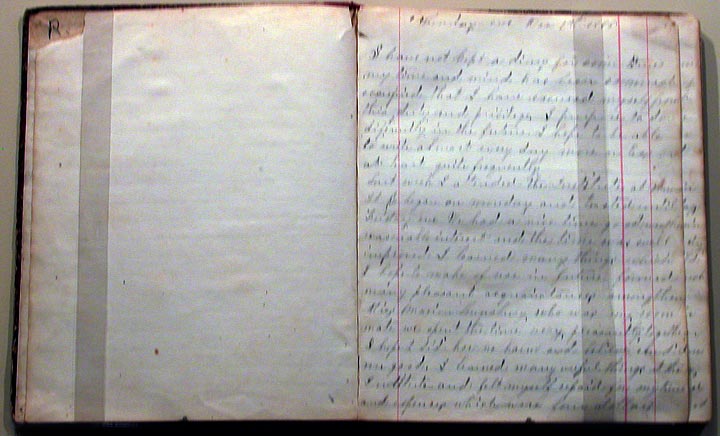
Sunday eve, Dec. 1st 1878
I have not kept a diary for some time my time and mind has been so much occupied that I have excused myself from this duty and privilege. I purpose to do differently in the future. I hope to be able to write almost every day more or less or at least quite frequently
Last week I attended the Institute at Aurora. It began on Monday and lasted until Friday eve We had a nice time good weather reasonable interest and the time was well improved I learned many things which I hope to make of use in future formed many pleasant acquaintances among them Miss Marion Lounsbury who was my roommate we spent the time very pleasantly together, I hope I did her no harm and believe she did me good. I learned many useful things at the Institute and felt myself repaid for my time and expenses which were four dollars
I attended church today. Brother Grundy preached did reasonably well his text was the parable of the grain of mustard seed, his grammar and elocution are very faulty but he seems in earnest and I believe will yet make a preacher whom the multitudes will respect Our sunday-school was well attended and a good degree of interest manifested in the lessons Our quarterly meeting will be held here two weeks from today and tomorrow I hope we shall have a good time of refreshing from the presence of the Lord.
I shall go into the schoolroom tomorrow again. I feel something like trying some of the new methods of teaching which we have been discussing at the Institute Hope to be able to introduce word analysis soon as I think it a good plan for teaching spelling especially to advanced pupils. I must close for tonight as it is bedtime and I feel like improving my time sleeping having lost considerable sleep during the past week.
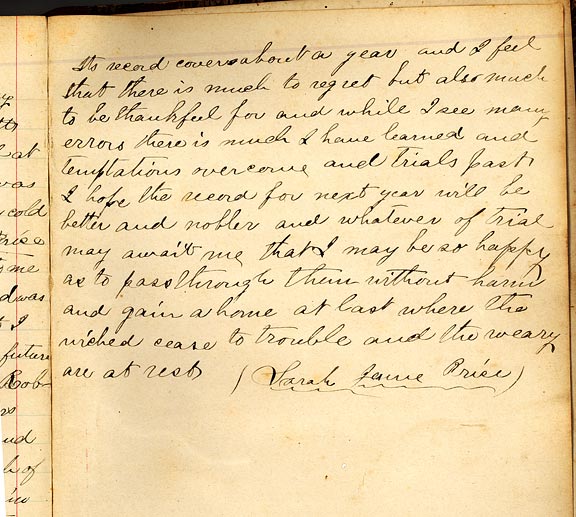
This entry from the last page of Price’s 1897 diary, eloquently describes her reasons for keeping a record of her life.
Sabbath Nov. 30th 1879
I have filled a volume in my journal and shall lay it away for future reference. Its record covers about a year and I feel that there is much to regret but also much to be thankful for and while I see many errors there is much I have learned and temptations overcome and trials past I hope the record for next year will be better and nobler and whatever of trial may await me that I may be so happy as to pass through them without harm and gain a home at last where the wicked cease to trouble and the weary are at rest. Sarah Jane Price
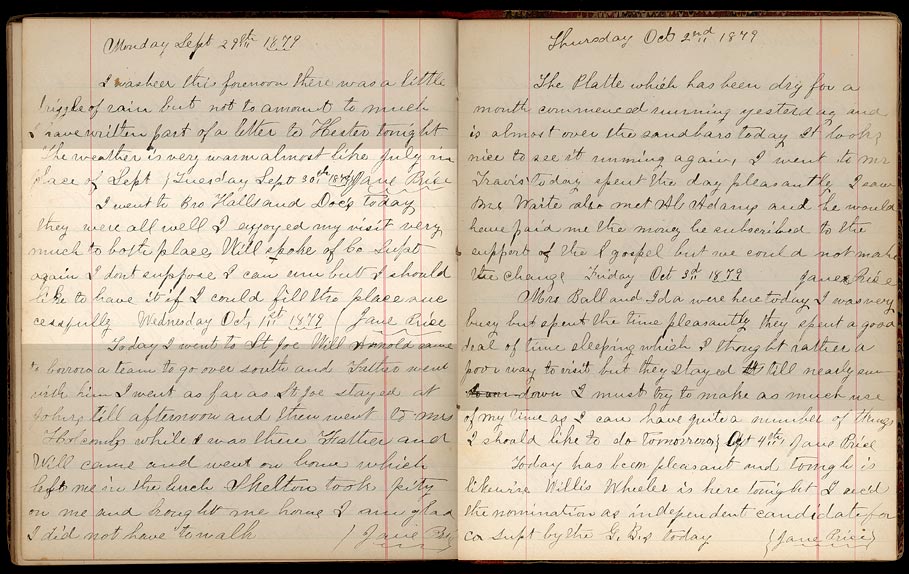
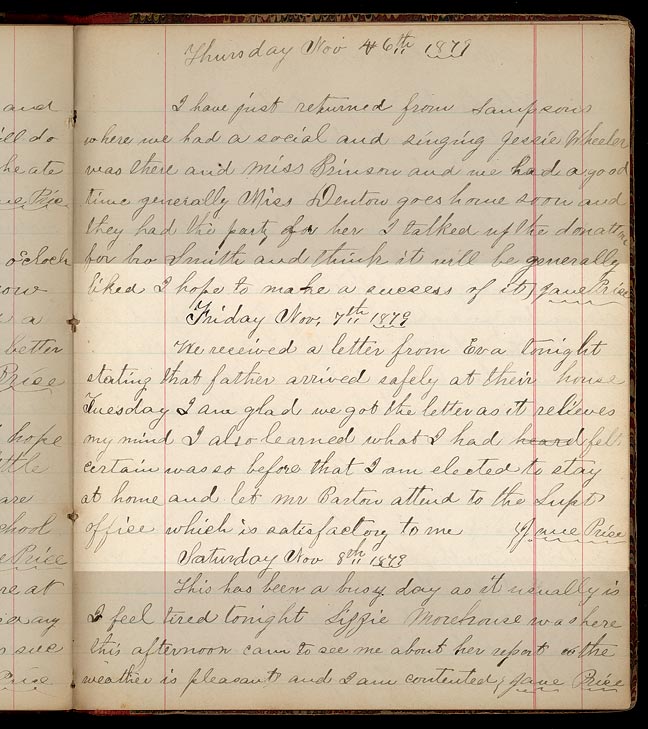
Price’s diary entries reveal a very modest woman. Her obituary identifies her nomination by the Greenback Party for county school superintendent as a major achievement in her life, and for a woman in that time to receive that kind of recognition of her abilities was no small thing. In fact, her obituary mentions that the party’s nominee for that position two years later was Silas A. Holcomb, later to be elected governor of the state. But Price’s own diary makes surprisingly brief mention of her candidacy.
Sept. 30, 1879
Will spoke of Co Supt again I don’t suppose I can win but I should like to have it if I could fill the place successfully
October 4th
Willis Wheeler is here tonight I rec’d the nomination as independent candidate for Co Supt by the G.B’s today.
And finally on Nov. 7th,
I also learned what I had felt certain was so before that I am elected to stay at home and let Mr. Barton attend to the Supt office which is satisfactory to me
Diary of William Arthur Danley, Businessman
Born in Danvers, Illinois, in 1860, William Arthur Danley moved to Niobrara, Nebraska, with his parents and sister in 1879. He began doing grading work for the Chicago, Burlington and Quincy Railroad and in 1884 purchased a dairy in Chadron. In 1888 he married Jennie Hollenbeck. After holding several different jobs, he purchased Lambert’s bakery in Chadron. Danley twice served as postmaster of Chadron and served on the city council for six years. In 1907 he sold his bakery and purchased a book and stationery business, which he operated until his death in 1927.
(At right) Studio portrait of William Danley taken by R. Busse, Chadron, Nebraska.
The back of the photograph is signed to Miss Jennie Hollenbeck, William’s future wife.
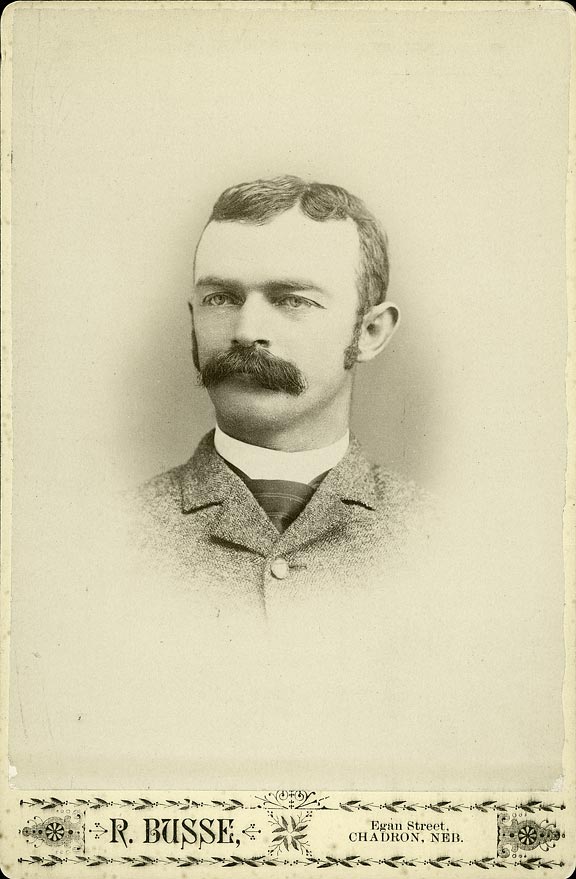
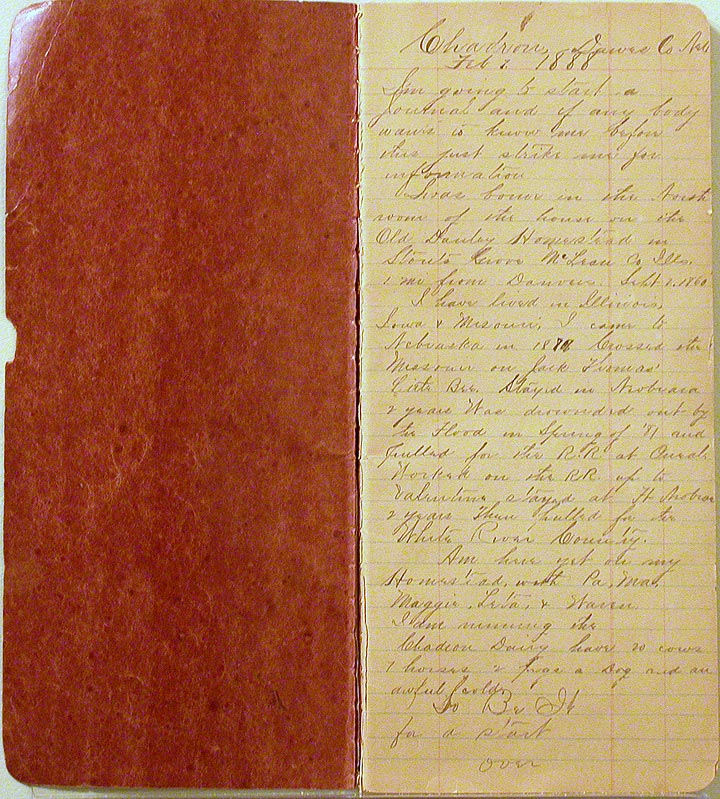
William Arthur Danley began his 1888 diary not with a set of expectations for the volume, but with an accounting of his life to date.
Chadron, Dawes Co. Neb
Feb. 1, 1888
I’m going to start a Journal and if any body wants to know me before this just strike me for information
I was borne in the North room of the house on the Old Danley Homestead in Stouts Grove McLean Co Ills. 1 mi from Danvers. Sept 2, 1860.
I have lived in Illinois, Iowa & Misouri. I came to Nebraska in 1879 Crossed the Missouri on Jack Thomas’ Little Bee. Stayed in Niobrara 2 years Was drownded out by the Flood in Spring of ’81 and pulled for the R.R. at Oural. Worked on the R.R. up to Valentine stayed at Ft. Niobrara 2 years Then pulled for the White River Country.
Am here yet on my Homestead, with Pa, Ma, Maggie, Leta, & Warren. I am running the Chadron Dairy have 20 cows 7 horses, 2 pigs a Dog and an awful cold.
So Be It for a start.
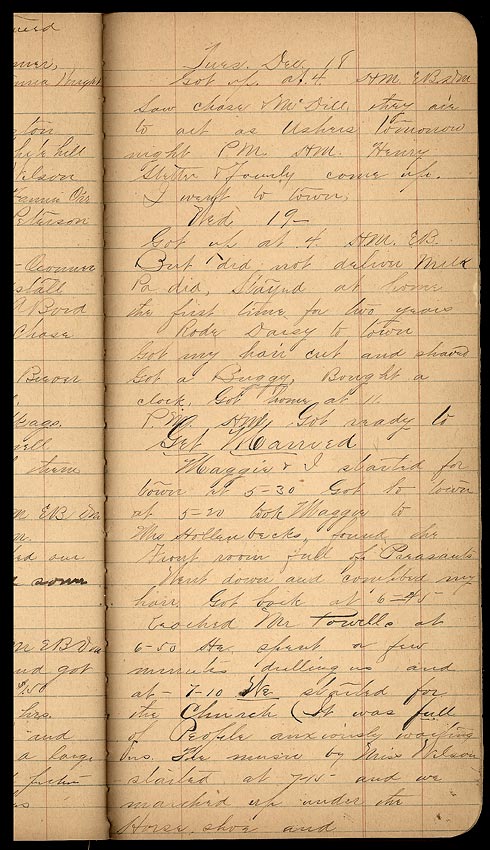
His most important entry is that for the day of his wedding to Jennie Hollenbeck, in which he accounts for his entire day from rising at 4:00 a.m. to retiring at midnight.
Wed 19 (Dec)
Got up at 4 H.M. E.B. But did not deliver milk Pa did, Stayed at home the first time for two years Rode Daisy to town Got my hair cut and shaved Got a Buggy, Bought a clock. Got home at 11.
P.M. H.M. Got ready to Get Married
Maggie & I started for town at 5-30 Got to town at 5-20 took Maggie to Mrs. Hollenbecks, found the Front room full of Parasants.
Went down and combed my hair. Got back at 6-45 Reached Mr. Powelle at 6-50 He spent a few minutes drilling us and at 7-10 We started for the Church (It was full of People anxiously waiting us. The music by Miss Wilson started at 7-15 and we marched up under the Horse shoe and Mr. Powell Married us. I was a little weak in the knees, but got through all O.K. and shook hands with everybody.
Went back to Mother Hollenbecks and packed up our preasants and got home at 9.
Eat a Lunch and Went to Bed at 12 0’clock.
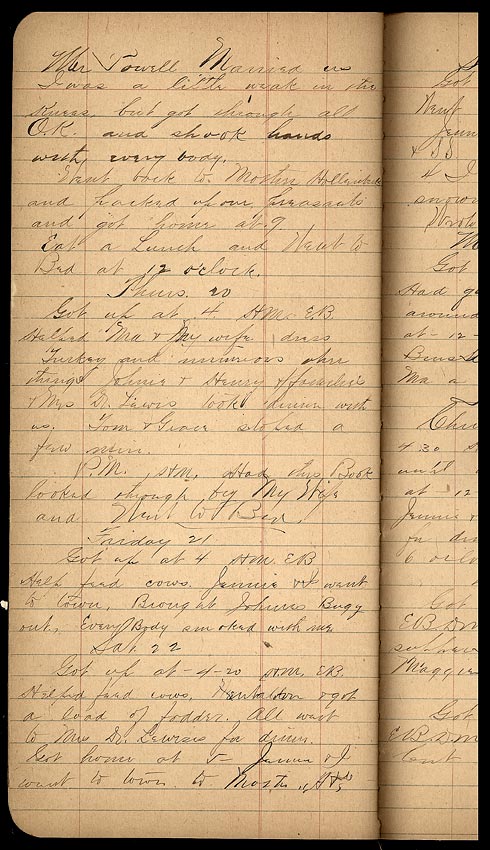
Even more interesting than his account of his wedding is William’s entry for the next day. Clearly, his diary was important enough that he wished to share its secrets with the person closest to him, his new wife.
Thurs. 20
Got up at 4. H.M. E.B.
Helped Ma & My Wife dress Turkey and numerous other things Johnie & Henry ___________ & Mrs D. Lewis took dinner with us. Tom & Grace stoped a few min.
P.M. H.M. Had this Book looked through by My Wife and Went to Bed.
Diary of Job and Eliza Green, Homesteaders and Farmers
Job Green was born in Illinois in 1848. His father died when he was nine years old and he helped his mother run the family farm until 1865, when he joined the Illinois Infantry to fight in the Civil War. He returned to Illinois to farm and in 1869 married Eliza Knowlton of Milwaukee, Wisconsin. In 1871, Job traveled to Boone County, Nebraska, where he homesteaded land two miles west of the present day town of Albion. In 1872, Eliza joined Job in Nebraska, where they farmed and Eliza taught school. Eliza died in 1923 and Job in 1933.
It is unclear whether the volume that became Job Green’s travel journal was initially intended for that use, because its early pages are filled with verse by Eliza R. Knowlton, Job’s future wife, on the purpose of an autograph album.
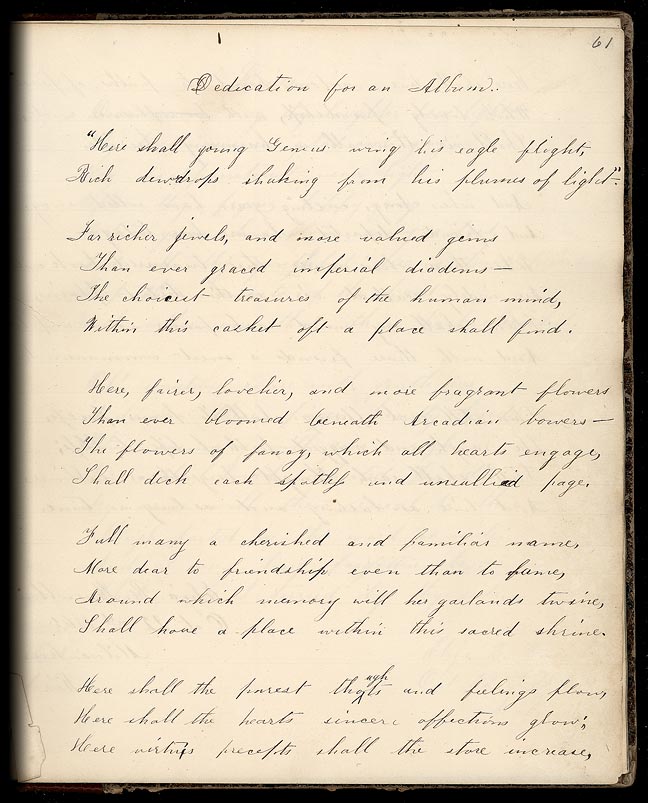
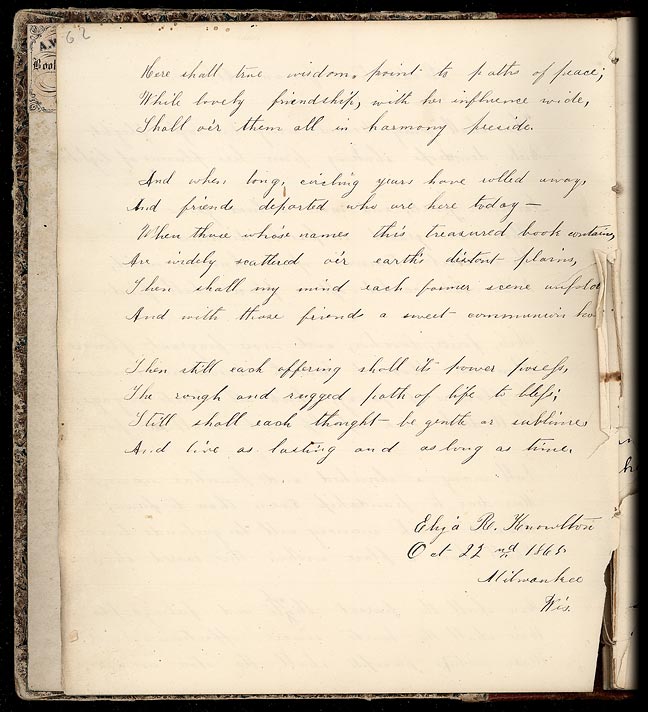
Dedication for an Album
“Here shall young Genius wing his eagle flight,
Rich dewdrops shaking from his plumes of light”
Far richer jewels, and mare valued gems
Than ever graced imperial diadems-
The choicest treasures of the human mind,
Within this casket oft a place shall find.
Here, fairer, lovelier, and more fragrant flowers
Than ever bloomed beneath Arcadian bowers-
The flowers of fancy, which all hearts engage,
Shall deck each spotless and unsullied page.
Full many a cherished and familiar name,
More dear to friendship even than to fame,
Around which memory will her garlands twine,
Shall have a place within this sacred shrine.
Here shall the purest thoughts and feelings flow,
Here shall the heart’s sincere affections glow;
Here virtues precepts shall the store increase,
Here shall true wisdom point to paths of peace;
While lovely friendship, with her influence wide,
Shall o’er them all in harmony preside.
And when long, circling years have rolled away,
And friends departed who are here today-
When those whose names this treasured book contains,
Are widely scattered o’er earth’s distant plains,
Then shall my mind each former scene unfold,
And with those friends a sweet communion hold.
Then still each offering shall its power posess,
The rough and rugged path of life to bless;
Still shall each thought be gentle or sublime
And live as lasting and as long as time
Eliza R. Knowlton
Oct. 22nd 1865
Milwaukee Wis
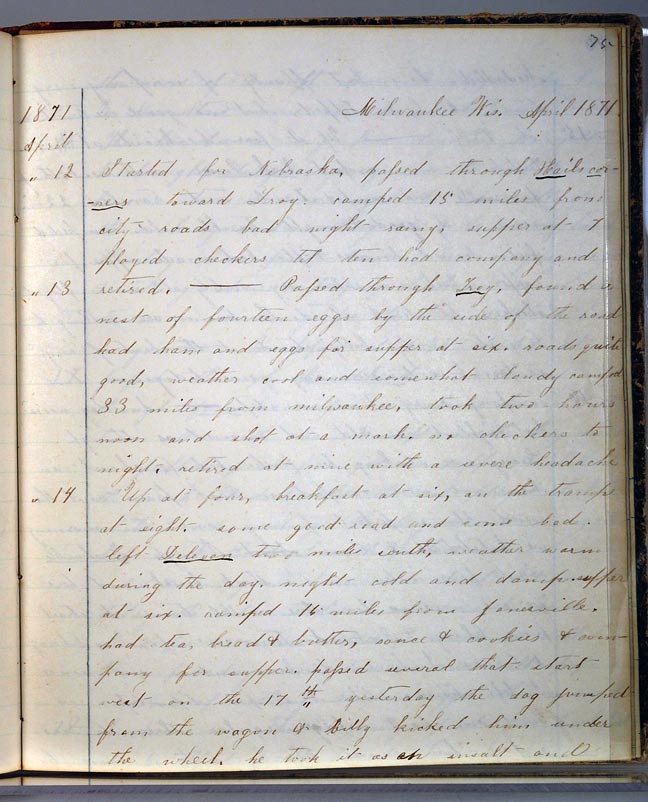
In the 1860s and 1870s, travel to and through the West could be difficult. Early journals and diaries, such as Job’s, provide an accurate picture of those difficulties, along with the pleasures and excitement of travel.
April 12 1871
Started for Nebraska, passed through Hails corners toward Troy. camped 15 miles from city roads bad night rainy, supper at 7 played checkers til ten had company and retired.
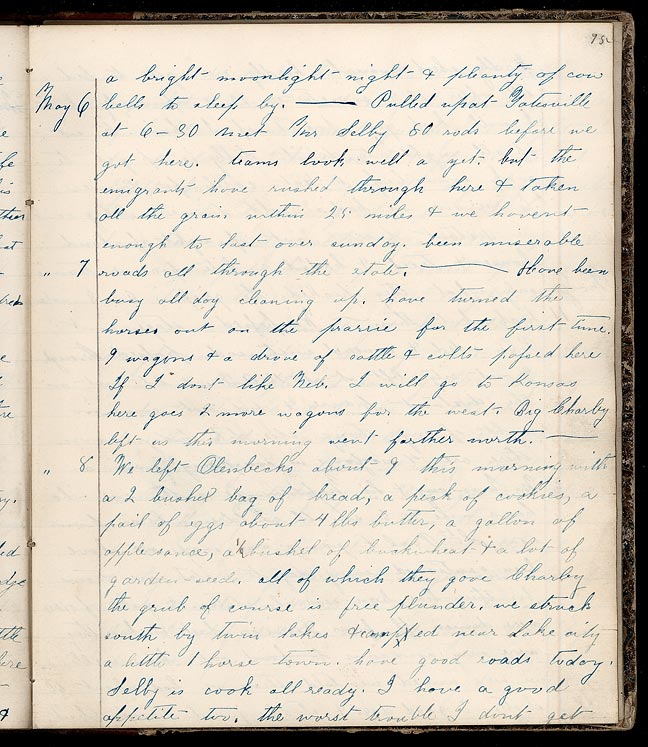
May 7
Have been busy all day cleaning up. have turned the horses out on the prairie for the first time. 9 wagons & a drove of cattle & colts passed here If I don’t like Neb. I will go to Kansas here goes 2 more wagons for the west. Big Charley left us this morning went farther north.
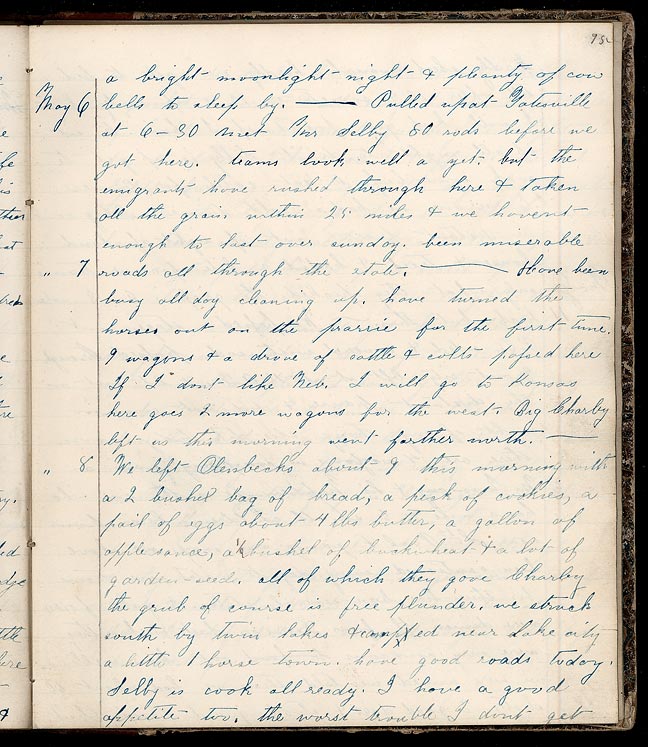
May 13, 1871
For the last few days we have had splendid roads & weather. And it is fun to travel then. For 2 days now we have been following the Boyer River, a very deep & narrow river, & crooked, with several Mills along its banks. The valley along the river is about one mile wide, & it is very deep & rich soil, being 6 or 8 feet deep, & it is settled up as well as the Miss. Valley. I find a great many Suckers here (Illi. chaps) but after you get out of the vally it is very high & rolling prairie, not very good. One old woman said she pittied us poor men that was going to Neb. that we could not raise anything there for they tried it there all last Winter & nearly starved out, some says one thing & some another.
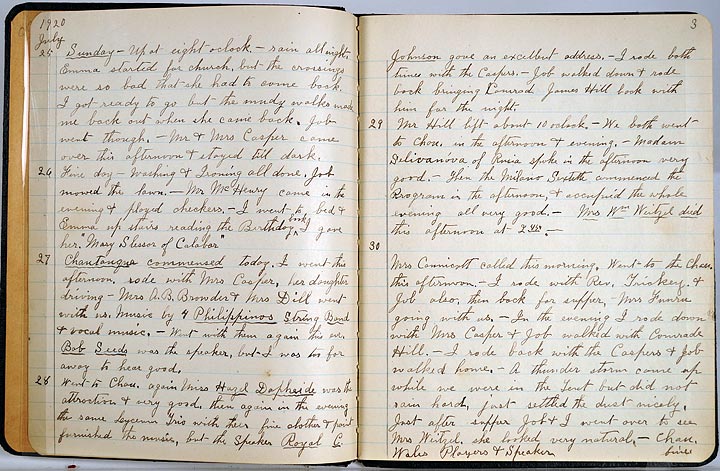
Eliza’s diaries record the life that she and Job shared in Nebraska, beginning almost fifty years after Job’s account of his trip west and ending with her death in 1923. Her entries reveal a practical side to the woman who wrote the flowery verse for her future husband’s journal. These journals are filled with daily chores, news of the neighborhood, and special events such as attending a Chautauqua.
July 27 (1920)
Chautauqua commensed today. I went this afternoon, rode with Mrs. Casper, her daughter driving — Mrs. A. B. Browder & Mrs. Dill went with us. Music by 4 Philippinos String Band & vocal music.-Went with them again this eve. Bob Seeds was the speaker, but I was too far away to hear good.
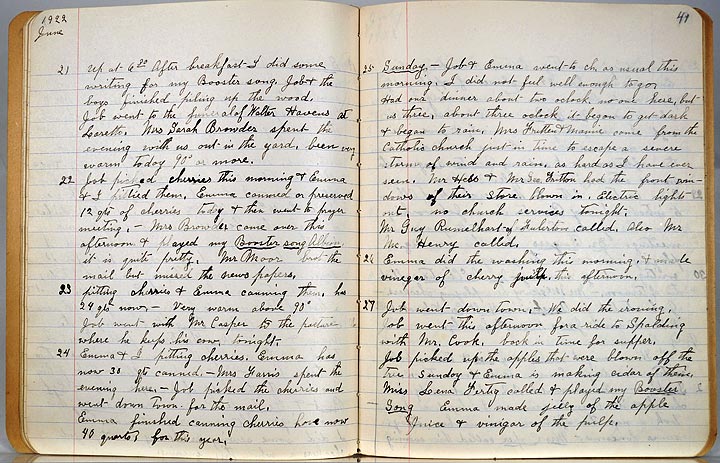
Eliza did not totally abandon her creative muse, for her 1922 diary includes numerous entries about a booster song that she wrote for the town of Albion and her efforts to have it published, sold, and sung.
June 22 (1922)
Job picked cherries this morning & Emma & I pitted them. Emma canned or preserved 12 qts of cherries today & then went to prayer meeting.-Mrs Browder came over this afternoon & played my Booster song Albion it is quite pretty. Mr. Moor brot the mail but missed the newspapers.
Eliza’s 1923 diary ends on a sad note, for it marks her death.
March 12 (1923)
Emma washing-Job went downtown. I went to bed just after breakfast & stayedtill noon. I can’t eat I don’t feel a bit well.
(this is the last Eliza wrote: Emma. I will continue it until after her death.)
Emma, Eliza and Job’s daughter, completed her mother’s diary with the news of her death on March 15 and an account of her funeral and burial.
Susie Buck, Farm Wife
Susie Clute was born in 1857 in Brimfield, Illinois, and married John M. Buck in 1877. In 1888 they moved to Sutton, Nebraska, to farm. In 1925 John died and Susie went to live with her son Ralph and his wife Mabel in Sutton. She died in 1952 in Lincoln, Nebraska.
Susie Buck’s twenty-two diaries held by the Nebraska State Historical Society span the years from 1911 through 1937. These small volumes are not designed for lengthy descriptions of a day’s events nor for musings on the meaning of life. True to their purpose, they are filled with short notes about weather, social life, farm and housework.
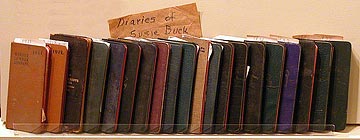
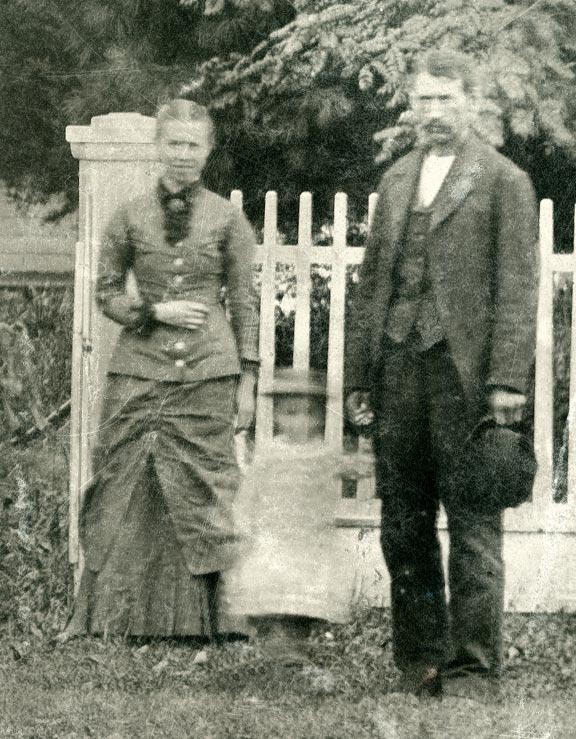
Susie and John Buck in front of their Sutton, Nebraska, home.
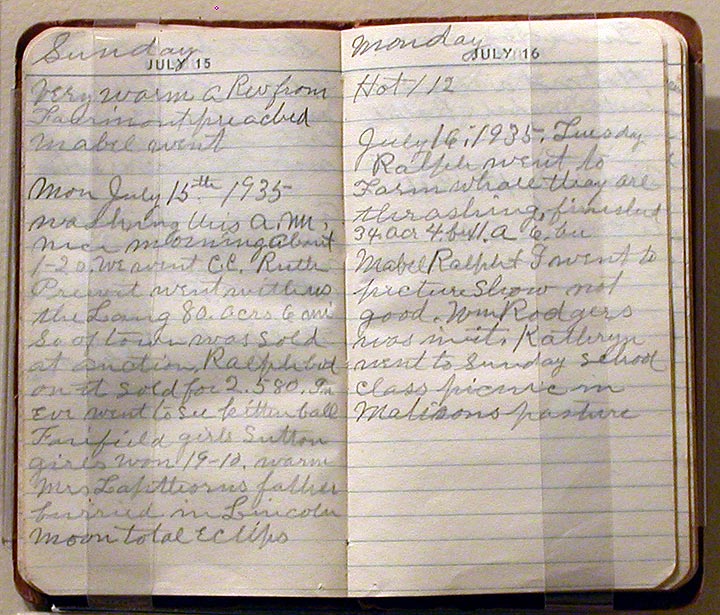
Mon, July 15, 1935
Washing this a.m. nice morning About 1-20 we went C.C. Ruth Prewit went with us the Lang 80 acres 6 mi. So of town was sold at auction Ralph bid on it sold for 2,580. In eve went to see kitten ball Fairfield girls Sutton girls won 19-10. warm Mrs. Lapttiorn’s father buried in Lincoln Moon total eclipse.
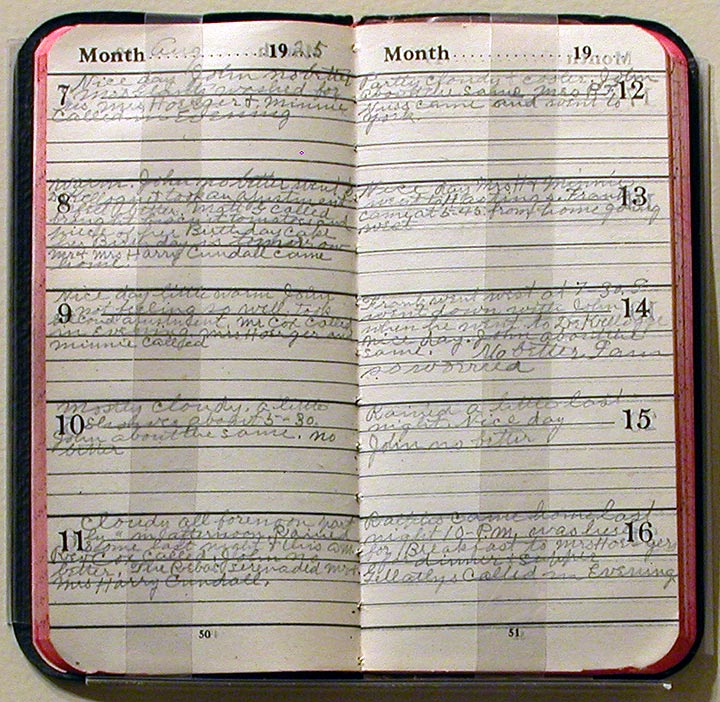
Even small diaries record important events in a person’s life. In July of 1925, Susie’s daily entries begin to mention her husband’s health.
Aug. 14
Frank went west at 7-30. I went down with John when he went to Dr. Kellogge. Nice day. John about the same. No better. I am so worried.
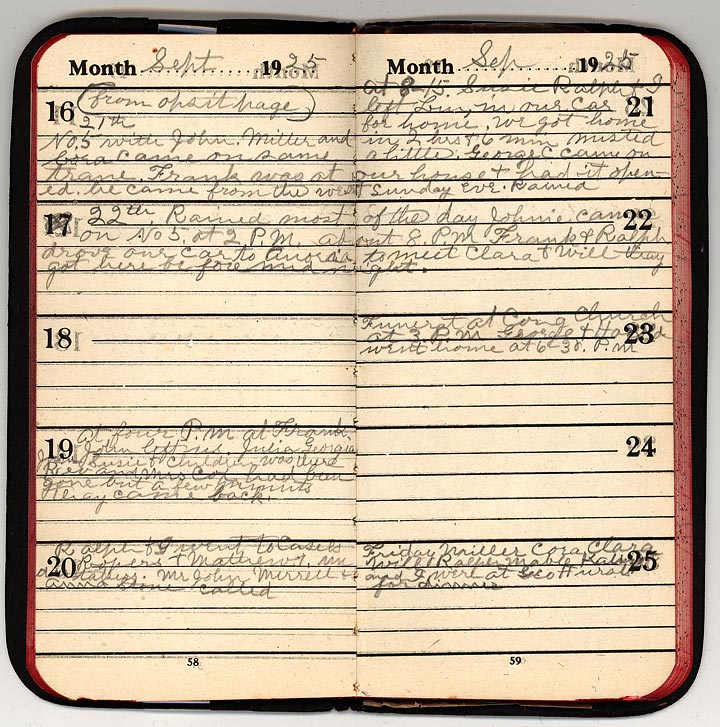
John’s health worsened and an increasing number of unfilled pages in Susie’s diary tells the story. Then, on September 19, Susie writes:
Sept. 19
At four p.m. at Franks John left us. Julia, Georgie, John, Susie & children was there. Rev. & Mrs. Cox had been gone but a few minutes. Then came back.
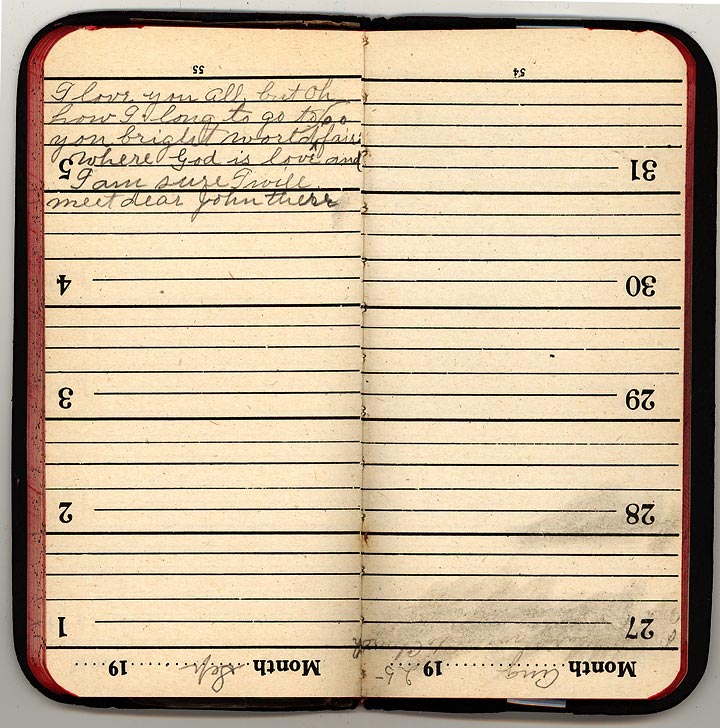
Susie’s diary entries are not given to emotion, but those entries following her husband’s death are irregular and on an unfilled page in September, Susie writes this:
I love you all, but oh how I long to go to you bright world so fair, where God is love and I am sure I will meet dear John there
Gradually Susie returns to fill her diary with brief entries about trips to town, visits with friends, and the work of keeping house. But for several months following John’s death, her diary entries occasionally end with “A lonesome day” or simply “lonesome.”

